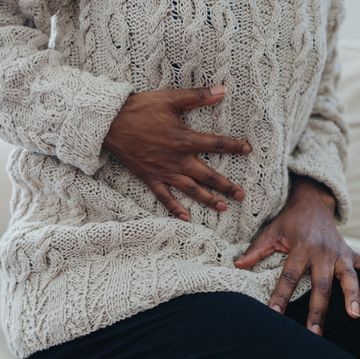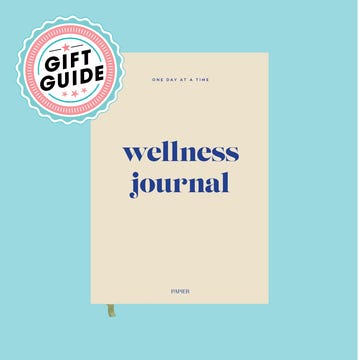Urinary incontinence is a symptom, not a disease. But the consequences of involuntary loss of urine can be debilitating to a person’s self-esteem, social life, and employment. That’s why Robert Schlesinger, MD, prefers to call incontinence a “social disease.”“People will go to almost any extent to adjust their lives to it. We had one woman who didn’t go out of her house for 3 years because she was so ashamed,” Schlesinger says. Twenty-five million adult Americans are affected by urinary incontinence. The great news is that incontinence can often be controlled with simple medications and lifestyle changes. “No one should be a slave to their bladder,” says Schlesinger.
MORE: 10 Things Only Someone With A Leaky Bladder Understands
Two types of incontinence are stress and urge incontinence. If coughing, laughing, exercising, or sneezing causes you to leak small amounts of urine, you may have stress incontinence. Physical changes resulting from pregnancy, aging, childbirth, and menopause are the common culprits behind stress incontinence. Urge incontinence (otherwise known as overactive bladder) happens when you suddenly feel the need to urinate and then lose control of your bladder. It seems to strike for no apparent reason, and is the most common form of incontinence in men and women. Inappropriate bladder contractions are the most common underlying cause of urge incontinence and can develop when the muscles and nerves that control the bladder’s “holding” ability are damaged.
A variety of conditions can cause such problems, including an enlarged prostate, a stroke, or a pinched nerve. In most cases, incontinence is a matter of degree. But it’s not a normal part of aging, says Neil M. Resnick, MD. “It’s not inevitable, and it’s not irreversible.” Because so many medical conditions can cause or contribute to it, it’s important to let your doctor know if you’re experiencing incontinence. But there are also some ways to help yourself control incontinence.
Keep A Bladder Diary
Keep track of the times you’ve had a urinary leak. Record the time, what you were drinking, when you went to the bathroom, and what you were doing at the time, such as coughing, laughing, sneezing, or exercising. The diary will help you and your doctor track down the cause.
Go Easy On Fluids
Your bladder diary may reveal that you’ve been drinking gallons of water. If you’re on a diet that requires taking in a lot of liquids, try drinking a little less and your incontinence problems may ease up. People have come to believe that a large intake of fluid is healthy. “There is nothing magic about drinking eight glasses of water a day,” says Schlesinger. The more you drink, the more you’ll have to void. “People should drink as they are thirsty,” he says. When you do drink, sip it throughout the day instead of downing large amounts at once.
Avoid Alcohol
Alcohol is a great stimulant for trotting to the bathroom. It also impairs your ability to know when to go. (Here's what'll happen if you stop drinking alcohol.)
Avoid Caffeine
Caffeine is another well-known diuretic. It also irritates the bladder and stimulates muscle contractions, which can aggravate the symptoms of urge incontinence, says Abraham N. Morse, MD. Caffeine is found in beverages, but also in foods such as chocolate and in medications such as Excedrin. Doctors advise limiting caffeine intake to no more than 200 milligrams daily, about the amount in 12 ounces of coffee. Your diary will help you track whether you’re getting too much. Switching to decaffeinated coffee or to tea will help, but it may not eliminate the problem, Morse says. There are other substances in coffee and tea that act as bladder irritants.
Avoid Citrus Juices
The acids in grapefruit, orange, tomato, and other fruit juices can cause bladder woes for many people. The only way to know for sure if these acids are part of the problem is to cut them out of your diet to see if your condition improves.
Skip The Oxalic Acids
Some people find relief when they stop eating foods containing oxalic acid, says Meg Gotelli, CN. Oxalic acid is a natural compound that in high amounts can cause kidney and stomach problems. Cooked spinach, rhubarb, chocolate, and even cigarettes all have oxalic acid (which gives you yet another reason to quit smoking).
Drink Flat Water
The carbon dioxide bubbles in fizzy water and soft drinks make the urine more acidic, which can trigger the urge to urinate, says Morse. (Here are 25 sassy water recipes to try.)
Build Up Your Bugs
The healthy bacteria, Lactobacillus acidophilus, provide protective bacteria in the urethra and the digestive tract, says Gotelli. Take a 1 billion strength lactobacillus acidophilus capsule once a day with a meal. These supplements are especially helpful if you’re on a course of antibiotics, she says. Antibiotics strip away all bacteria, good and bad, which can result in recurrent bladder infections. You should see improvements after 2 to 4 weeks. Once you’ve finished the supplements, eat 6 ounces of plain yogurt a day to help with urinary health.
Try Double Voiding
When you urinate, stay on the toilet until you feel your bladder is empty. Then, stand up and sit down again, lean forward slightly at the knees, and try again.
MORE: 5 Reasons It Hurts Down There
Know When You Should Go
It’s a good idea to empty your bladder on a regular basis, Schlesinger says. For example, don’t sit at the dinner table and hold it until dinner’s over. This practice may lead to a bladder infection and an overstretched bladder. Also, if your bladder is too full and your sphincter muscle weak, he says, you’re likely to leak when you cough, sneeze, or laugh. Your best bet is to empty your bladder before and after meals, and at bedtime.
Do Kegel Exercises
This exercise was developed in the late 1940s by Arnold Kegel, MD, to help women with stress incontinence during and after pregnancy. The experts say that doing this exercise reduces and may even prevent some forms of incontinence in both genders and at all ages. Here are the guidelines from the National Association for Continence. Without tensing the muscles of your legs, buttocks, or abdomen, imagine that you’re trying to hold back gas by tightening the ring of muscles (the sphincter) around the anus, and for women also around the vaginal area. This exercise identifies the pelvic muscles. When you’re urinating, try to stop the flow, and then restart it. This identifies the correct pelvic muscles. This exercise won’t build the pelvic muscles, but you can use it as a bimonthly test of how strong your muscles have become after a few weeks of Kegels. Every 2 weeks you should be able to hold your urine longer. Once you’ve isolated and identified the correct muscles, you’re ready for the complete exercise. Slowly tighten, lift, and draw in those muscles, and hold them for 5 seconds. Then rest for 10 seconds. Practice this exercise over several weeks to try to build your holding time to 10 seconds.
Outsmart The Urge
If you have urge incontinence, you have almost no warning of the need to go. Don’t panic. Instead, at first notice, relax. The same muscles you use to clench your buttocks can also be used to short-circuit those “gotta go” sensations. Clench the muscles as tightly as you can, and hold the tension for a few seconds. Doing this several times in a row often makes the urge to urinate disappear. “It’s like biting your lip when you have to sneeze,” says Morse. When the urge sensation passes, walk slowly, without panic, to the nearest restroom.
Quiet Your Mind
Another strategy for sudden urges is to “breathe deeply, calm yourself down, and have confidence that you’re not going to make a mess,” says Morse. If you can calm yourself for 30 to 60 seconds, there’s a good chance the urge will go away, he says.
Be Ready For Emergencies
If incontinence at night is a problem, and your doctor has ruled out fluid retention, keep a bedpan within reach of your bed. Remove any furniture or rugs that you could trip on during a quick nocturnal visit to the bathroom. Add night-lights to help you find your path without delays.
Compensate For Your Age
As you age, it takes longer to get places—including the bathroom. So make sure you always know bathroom’s location, and position yourself as close to it as possible.
MORE: 3 Yoga Poses To Help Beat Your Sneaky Leak
Review Your Meds
Any drugs that relax the nerves or muscles can cause incontinence. If you’re on medications to calm anxieties so you can sleep or relax, your bladder may not be sending the “I’m full” message to your brain quick enough, according to the National Kidney and Urologic Diseases Information Clearinghouse. Talk to your doctor if you suspect that your medications may be causing or contributing to your incontinence.
Buy Special Supplies
There are several brands of absorbent underpants, pads, and shields. The products absorb 50 to 500 times their weight in water, neutralize odor, and congeal fluid to prevent leakage. The type you need depends on your individual anatomy and the kind and degree of your incontinence. (Find out about a new tampon-like device that can prevent bladder leaks.)
Reduce The Tension In Your Life
“Whenever you’re anxious or depressed, your body sensations are magnified in a negative way,” says Morse. “If you’re anxious to begin with, feeling as though you have to rush to the bathroom is one more thing that can put you over the edge.” Take a hint from your bladder and unwind. Give yourself an hour each day to do something that’s just for you, like taking a long walk, watching some TV, going to a movie, or visiting museum.
When To Call A Doctor
“The vast majority of people with mild to moderate symptoms do not have to rush off to see a doctor. Give yourself 3 months to see if lifestyle measures work,” says Morse. Other symptoms—painful urination, incontinence that accompanies painful intercourse, or urine that’s cloudy or tinged with blood—are signs that it’s time to call a doctor right away. Urinary tract infections or even tumors can cause the bladder to go into overdrive. You should also call a doctor if you’re having large “accidents” rather than small leaks. Or if accidents are accompanied by numbness or weakness in your arms or legs, vision changes, or a change in bowel habits. These symptoms may be a sign of nerve damage or other neurological problems, such as Parkinson’s disease.
Panel Of Advisors
Meg Gotelli, CN, is director of Newstrition, a nutrition counseling service, and is nutrition consultant to Tower Urology in Los Angeles.
Abraham N. Morse, MD, is an associate professor of urogynecology at the University of Massachusetts Medical School in Worcester.
Neil M. Resnick, MD, is a professor of medicine and chief of the division of geriatric medicine at the University of Pittsburgh Medical Center.
Robert Schlesinger, MD, is medical director of the Continence Center at New England Sinai Hospital in Stoughton, Massachusetts.












